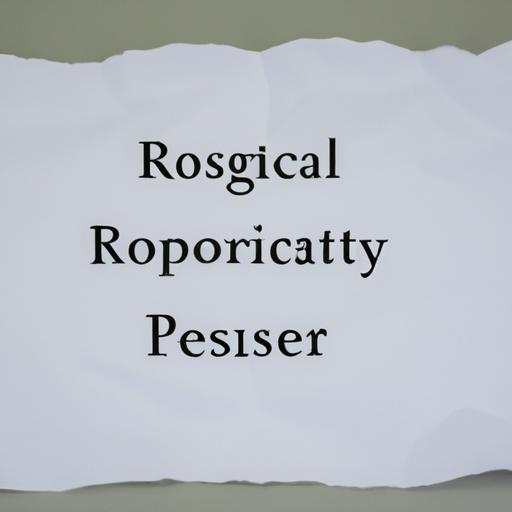Research Paper: A Comprehensive Guide to Writing an Effective Paper
Table of Contents
Research papers are an essential part of higher education, allowing students to demonstrate their knowledge, critical thinking skills, and ability to conduct independent research. Writing a research paper can be a daunting task, but with the right guidance, it can be a rewarding experience. In this article, we will provide a step-by-step guide to writing an effective research paper.
Choosing a Topic

Choosing the right topic is crucial to the success of your research paper. A well-chosen topic will make the research process easier and more enjoyable, and will also result in a more compelling paper. Here are some tips for choosing a topic:
Tip 1: Choose a Topic That Interests You
Choose a topic that you are genuinely interested in. This will make the research process more enjoyable and will also result in a more engaging paper. Think about the topics that you have studied in the past that have piqued your interest, or the subjects that you are passionate about.
Tip 2: Make Sure the Topic is Feasible
Make sure that the topic you choose is feasible. This means that there should be enough information available on the topic to support your research. It’s also important to consider the scope of the topic. If it’s too broad, you may have trouble covering it adequately in your paper. On the other hand, if it’s too narrow, you may struggle to find enough information to support your argument.
Tip 3: Consider the Assignment Guidelines
Consider the assignment guidelines when choosing your topic. Make sure that your topic meets the requirements of the assignment. If there are specific guidelines for the topic, make sure that you follow them.
By following these tips, you can choose a topic that is both interesting and feasible, and that meets the requirements of the assignment. In the next section, we will discuss how to conduct research on your chosen topic.
Conducting Research
Conducting research is a crucial part of writing a research paper. It’s essential to gather information from reliable sources to support your argument. Here are some tips for conducting research:
Tip 1: Start with General Sources
Start your research by using general sources such as textbooks, encyclopedias, and dictionaries. These sources will provide you with a broad overview of your topic and will help you to identify key concepts and keywords.
Tip 2: Use Academic Sources
Once you have identified key concepts and keywords, use academic sources such as peer-reviewed journals and scholarly books to gather more in-depth information on your topic. These sources are more reliable than general sources and will provide you with more detailed information.
Tip 3: Evaluate Your Sources
When conducting research, it’s essential to evaluate your sources to ensure that they are reliable and credible. Consider the author’s credentials, the publication date, and the publisher when evaluating your sources.
By following these tips, you can conduct effective research on your chosen topic and gather reliable information to support your argument. In the next sections, we will discuss how to outline and draft your research paper, and how to edit and revise your paper to ensure that it’s polished and professional.
Conducting Research
Different Types of Research Sources
There are various types of research sources that you can use to gather information for your research paper. Some of the common sources include:
-
Primary sources: These are sources that provide first-hand information on the topic, such as interviews, surveys, and original research studies.
-
Secondary sources: These are sources that provide second-hand information on the topic, such as books, articles, and reviews.
-
Tertiary sources: These are sources that provide an overview of a topic, such as encyclopedias, dictionaries, and bibliographies.
How to Evaluate Sources
When conducting research, it’s essential to evaluate your sources to ensure that they are reliable and credible. Here are some criteria to consider when evaluating sources:
-
Authority: Consider the author’s credentials and expertise on the topic.
-
Accuracy: Check the information in the source for accuracy and check any facts or statistics against other sources.
-
Objectivity: Consider any possible bias or agenda that the author may have.
-
Currency: Check the publication date of the source to ensure that it’s up-to-date.
Tips for Organizing Research Notes
Organizing your research notes is essential to ensuring that you have all the information you need to write your research paper. Here are some tips for organizing your research notes:
-
Use a note-taking system: Use a system that works for you to take notes, such as index cards, a notebook, or a digital system.
-
Label your notes: Label your notes with the source and page number to ensure that you can easily find the information when you need it.
-
Use headings and subheadings: Use headings and subheadings to group related information together and make it easier to find.
By following these tips, you can conduct effective research for your research paper and organize your notes in a way that makes the writing process easier.
Outlining and Drafting
Importance of Creating an Outline
Creating an outline is an essential step in the research paper writing process. An outline helps you to organize your thoughts and ideas and provides a framework for your paper. Here are some benefits of creating an outline:
-
It helps you to stay focused on the main topic and avoid getting off track.
-
It ensures that you cover all the necessary points and include all the relevant information.
-
It helps you to identify any gaps in your research and address them before you start writing.
Tips for Creating an Effective Outline
When creating an outline, there are some tips that you can follow to ensure that it’s effective:
-
Use a hierarchical structure: Use a hierarchical structure that starts with the main topic and breaks it down into smaller subtopics.
-
Use parallelism: Use parallelism to ensure that each subtopic has a similar level of importance.
-
Use bullet points or numbers: Use bullet points or numbers to make the outline easy to read and follow.
Strategies for Writing the First Draft
Once you have created an outline, you can start writing the first draft of your research paper. Here are some strategies for writing the first draft:
-
Don’t worry about perfection: Don’t worry about getting everything perfect in the first draft. Just focus on getting your ideas down on paper.
-
Use your outline as a guide: Use your outline as a guide to ensure that you cover all the necessary points.
-
Write in a clear and concise manner: Write in a clear and concise manner to ensure that your ideas are easy to understand.
By following these tips, you can create an effective outline and write a first draft that lays the foundation for a polished and professional research paper.
Editing and Revising
Editing and revising are crucial steps to ensure that your research paper is polished and professional. Here are some tips for editing and revising your paper:
Importance of Editing and Revising
Editing and revising are essential to ensure that your paper is free from errors, and that your argument is clear and concise. Editing involves checking for grammar, spelling, and punctuation errors, while revising involves reviewing your paper for content, structure, and coherence.
Tips for Self-Editing
When self-editing your paper, it’s important to take a break before reviewing your work. This will help you to approach your paper with fresh eyes and will enable you to identify errors more effectively. Read your paper aloud, and pay attention to sentence structure and flow. Use tools such as Grammarly to check for grammar and spelling errors.
How to Effectively Incorporate Feedback
Incorporating feedback from others is an essential part of the editing and revising process. When receiving feedback, it’s important to remain open-minded and receptive to constructive criticism. Take the time to review the feedback carefully and make necessary changes to your paper. It’s also important to seek feedback from multiple sources to get a well-rounded perspective on your work.
By following these tips, you can ensure that your research paper is polished and professional, and that your argument is clear and concise.
Formatting and Citations
Proper formatting and citations are essential to ensure that your paper is professional and easy to read. Here are some tips for formatting and citations:
Common Citation Styles
There are several citation styles, including APA, MLA, and Chicago. It’s essential to use the correct citation style for your paper to ensure that your sources are properly cited. Each citation style has specific guidelines for formatting, so it’s important to become familiar with the guidelines for your chosen citation style.
Importance of Proper Formatting
Proper formatting is essential to ensure that your paper is professional and easy to read. Use a clear font, such as Times New Roman or Arial, and double-space your paper. Use headings and subheadings to organize your paper, and include a title page and reference page.
Resources for Formatting and Citation Assistance
There are several resources available to assist with formatting and citation, including online citation generators and reference management software. These tools can help you to format your citations correctly and can save you time when formatting your paper.
By following these tips, you can ensure that your research paper is properly formatted and that your sources are properly cited, making your paper professional and easy to read.

